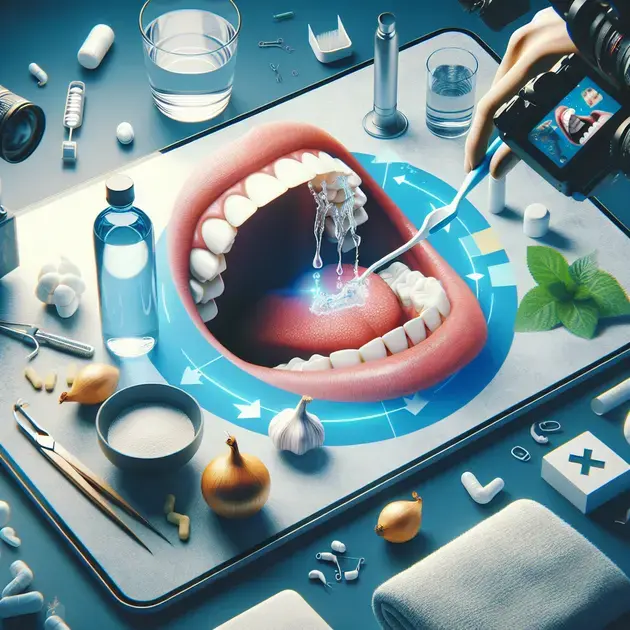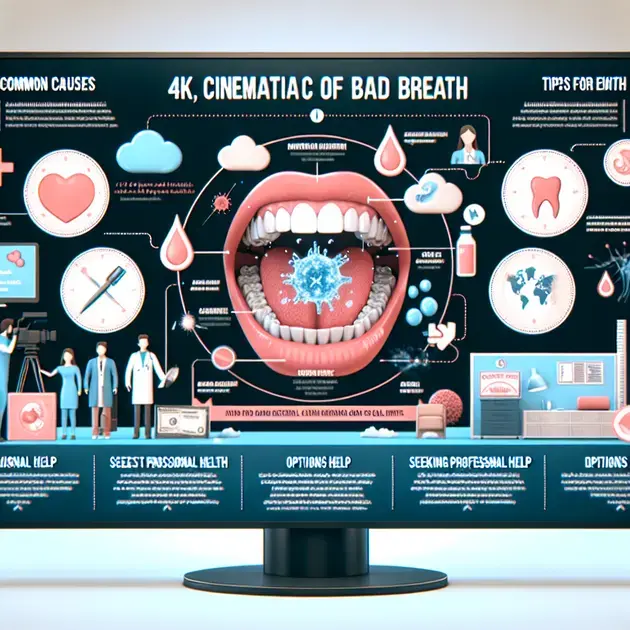Why Does Bad Breath Happen?
Bad breath, also known as halitosis, is a common issue that can be embarrassing and often a cause of discomfort. Understanding the root causes of bad breath is crucial in addressing the problem effectively. From poor oral hygiene practices to underlying health conditions, several factors can contribute to this condition. Let’s delve into the reasons behind bad breath and explore ways to combat it.

**Understanding the Causes of Bad Breath**
Common Factors Contributing to Bad Breath
Bad breath, also known as halitosis, can be caused by various factors that affect the mouth, throat, and gastrointestinal tract. One common culprit is poor oral hygiene, which leads to the buildup of bacteria on the teeth, gums, and tongue. To combat this, it’s essential to brush your teeth twice a day, floss daily, and use mouthwash to eliminate bacteria.
Additionally, certain foods like garlic, onions, and spicy dishes can leave a lingering odor in the mouth, contributing to bad breath. To minimize this effect, consider avoiding these foods or thoroughly cleaning your mouth after consuming them.
Another factor that can lead to bad breath is dry mouth, which occurs when there is a decreased production of saliva. Drinking plenty of water throughout the day and chewing sugar-free gum can help stimulate saliva production and keep your mouth moist.
Furthermore, smoking and tobacco products can not only stain your teeth but also cause bad breath. Quitting smoking can significantly improve the freshness of your breath and overall oral health.
If bad breath persists despite proper oral hygiene practices, it may indicate an underlying health issue such as gum disease, sinus infections, or digestive problems. Seeking advice from a healthcare professional can help identify and address the root cause of chronic bad breath.
Exploring the Science Behind Halitosis
Halitosis is a complex condition that can result from both oral and systemic factors. One of the primary causes is the breakdown of food particles by bacteria in the mouth, which produces sulfur compounds responsible for the foul odor. Understanding this process can help in developing effective strategies for combating bad breath.
Studies have shown that certain bacteria species, such as Porphyromonas gingivalis and Prevotella intermedia, are commonly found in individuals with chronic halitosis. Monitoring the levels of these bacteria through microbiome analysis can provide insights into the microbial imbalance contributing to bad breath.
Moreover, volatile sulfur compounds (VSCs) like hydrogen sulfide and methyl mercaptan play a significant role in the malodor associated with halitosis. These compounds are byproducts of bacterial metabolism and can be detected using specialized gas chromatography techniques.
Recent advancements in breath analysis technologies, such as portable sulfur gas analyzers and electronic noses, have enabled researchers to pinpoint the specific compounds responsible for halitosis. By identifying these compounds, targeted treatments and therapies can be developed to address the underlying causes of bad breath.
Overall, delving into the scientific mechanisms behind halitosis offers valuable insights into the multifaceted nature of bad breath and opens up new avenues for research and innovation in oral care.

**How to Prevent Bad Breath**
Understanding the Causes
Preventing bad breath starts with understanding the underlying causes. Common culprits include poor oral hygiene, certain foods, dry mouth, and underlying health conditions. It’s essential to maintain a regular oral care routine, which includes brushing your teeth twice a day, flossing daily, and using mouthwash. Avoiding foods like garlic and onions can also help in preventing bad breath.
Step-by-step guide:
1. Brush your teeth at least twice a day, especially after meals.
2. Floss daily to remove food particles stuck between teeth.
3. Use an antibacterial mouthwash to kill odor-causing bacteria.
4. Stay hydrated to prevent dry mouth, a common cause of bad breath.
5. Visit your dentist regularly for check-ups and professional cleanings.
Healthy Habits for Fresher Breath
Incorporating healthy habits into your daily routine can significantly contribute to preventing bad breath. Drinking an adequate amount of water helps to keep your mouth hydrated and wash away food particles. Chewing sugar-free gum or mints can also stimulate saliva production, which aids in neutralizing odor-causing bacteria.
Step-by-step guide:
1. Drink plenty of water throughout the day to keep your mouth moist.
2. Include crunchy fruits and vegetables in your diet to help clean your teeth naturally.
3. Avoid smoking and limit alcohol consumption, as they can contribute to bad breath.
4. Practice tongue scraping to remove bacteria buildup on your tongue.
5. Maintain a well-balanced diet rich in vitamins and nutrients for overall oral health.
Seeking Professional Help
If bad breath persists despite following oral care routines and healthy habits, it may be necessary to seek professional help. A dentist or healthcare provider can evaluate your oral health, identify any underlying issues, and provide targeted treatments to address chronic halitosis. In some cases, bad breath may be a symptom of more serious health conditions, requiring a comprehensive diagnosis and treatment plan.
Step-by-step guide:
1. Schedule an appointment with your dentist for a thorough oral examination.
2. Discuss any medications you are taking that may be contributing to bad breath.
3. Consider consulting a specialist, such as a periodontist or oral surgeon, for advanced treatment options.
4. Follow your healthcare provider’s recommendations for managing underlying health issues that may be causing bad breath.
5. Stay proactive in your oral care routine and communicate any concerns with your healthcare team for personalized advice.
Conclusion
Understanding the causes of bad breath is crucial for effectively combating this common issue. From poor oral hygiene and certain foods to dry mouth and underlying health conditions, various factors can contribute to halitosis. By maintaining a consistent oral care routine, including brushing, flossing, and using mouthwash, individuals can significantly reduce the risk of bad breath.
Incorporating healthy habits like staying hydrated, consuming crunchy fruits and vegetables, and avoiding smoking can further promote fresher breath. Seeking professional help is advisable if persistent bad breath persists, as it may indicate more serious underlying health issues that require targeted treatment.
The science behind halitosis reveals the intricate interplay of oral and systemic factors, shedding light on the microbial imbalances and volatile sulfur compounds responsible for malodorous breath. Advanced technologies in breath analysis enable precise identification of compounds linked to halitosis, paving the way for personalized treatment strategies.
Ultimately, by arming oneself with knowledge about the causes of bad breath, adopting preventive measures, and being proactive in seeking professional guidance if needed, individuals can enjoy a renewed sense of confidence and oral freshness. Embracing a holistic approach to oral health and cultivating healthy habits are key in the ongoing quest for long-lasting fresh breath and overall well-being.